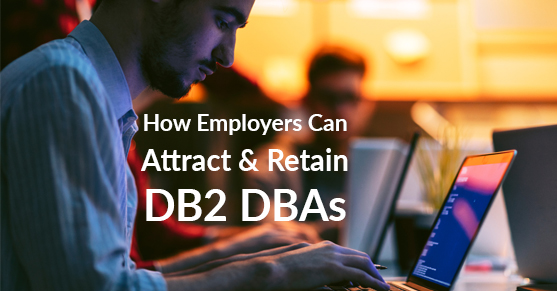What can you do to attract and retain skilled and constantly
evolving DB2 DBAs? In my 14 years working with DB2 at a number of companies, I
have seen a number of different environments, and the ones that keep talented
folk happy provide these things:
Technical Breadth and Depth of Work
What’s the first thing I look for in an employer? Salary?
Corporate Culture? Nope. The first thing I look for is interesting work. No DBA
wants to sit and support obsolete 7-year old DB2 databases that they’re not
allowed to upgrade and that half of the new tricks and features don’t work on.
Those of us who have remember sheepishly raising our hands in a user group or
conference session when the presenter asked about older versions and being
embarrassed that we were unable to effect an upgrade. I have left a good-paying
job at a good employer for more interesting technical work, and I’d bet a lot
of other DBAs have too. If I can be trying new features and applying the full
suite of different tools and options all available as a part of DB2, that’s
when I’m happiest.
Support for Participation in the DB2 Community
Part of any DBA’s job is keeping up on the technology and
learning about all the things that DB2 can do that they don’t see every day.
The best way to do that is to participate in the DB2 community in one or more
ways. For me, it’s blogging and also going to/presenting at conferences. Not
every DBA likes the same ways to participate, but most of us like at least one.
Here are the most obvious ones:
- Attending IDUG conferences in North America, EMEA, Australia, or India
- Attending IBM Insight annually in Las Vegas
- Attending DB2 Symposiums
- Presenting at any of the conferences
- Attending, presenting at, or even running regional user group meetings
- Volunteering for IDUG
- Blogging – writing their own blog or contributing to the IDUGcontent blog or other blogs
- Writing articles for IBM developerWorks or IBM Big Data & Analytics Hub
- Asking/answering questions on forums
- Watching the DB2Night Show
- Participating in DB2’s Got Talent on the DB2Night Show
- Offering and recording webinars or YouTube videos
No DB2 DBA is going to want to do all of these and some of
us have particular aversions to or preferences for one or more of them. The
support for doing whichever of these a DBA finds appealing is very critical,
even if it can be expensive in terms of travel expenses or time spent. The
investment is worth it. If you invest in them, they’ll use that investment to
be better at their jobs.
Ability to not be On-Call 24/7/365
No matter how much we love our jobs, we don’t want to be the
only one answering calls and handling all of the work. We need backup for some
evening or weekend time off, or for vacation, or even for illness. The best
situation is when you have a team of DB2 DBAs working together to balance the
work and ensure everyone has some work/life balance. This is more difficult in
smaller organizations. An on-call rotation that includes technical people with
vastly different skill sets is more likely to add stress than relieve it. If
you don’t have the manpower to accomplish this, consider contracting with a
service like Virtual-DBA
to provide much-needed relief.
Mentors
I have had many mentors and have been a mentor. It is an
ideal situation when you have a sizable team of DBAs with varying skill levels
and specialties, as they can mentor each other on different technical topics
and career directions. It is also important to have approachable management to
help a DBA navigate things at a non-technical level. Participating in the DB2
community can help a DBA find mentors. Also, sending them to training classes
or bringing someone in to train your DBAs can be very helpful as well. XTIVIA can provide
training and mentoring for your in-house DBAs or other technicians.
A Culture not Focused on Blame
I’ve worked with organizations where the primary goal during
any outage or problem was to rest the blame somewhere and punish the guilty
party. It took a lot longer to solve problems as a result and resulted in a
very high turnover rate because of the negative emphasis. Working in an
environment where the goal is clearly to solve the problem and prevent future
issues is so much more comfortable and productive. There are a thousand and one
small things that an organization does that influence this, but both the
organization and the individuals are better for realizing that people make
mistakes and that the real goal is to provide the best possible services, not
to punish the under-performers. People learn from their mistakes and become
better at their jobs as a result. In the case of an outage, you’ve just paid a
high price for training on that specific issue – get the full benefit from that
price by keeping and encouraging your people.
The Basics
Database administration is a well-paid specialty, and a
talented DBA’s salary is sometimes higher than other IT professionals at the
same level. A decent salary is still important, and many DBAs have worked at
IBM or other large companies and had considerable huge-company health, time
off, and retirement benefits. My biggest shocks on leaving IBM were the huge
increase in pay, and the abysmal retirement and time off benefits by
comparison. If you have everything else in line, you don’t have to pay
top-dollar, but you can’t dip too low without insulting people either. This
obviously varies by company, but the top DB2 talent is not wooed by
compensation alone.
Ember Crooks
Lead DB2 DBA / Delivery Manager at Xtivia
IBM Champion – Information Management
IBM Gold Consultant

